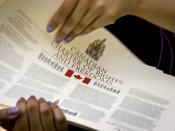According to dictionary.com , civil disobedience is defined as "the refusal to obey certain laws or governmental demands for the purpose of influencing legislation or government policy, characterized by the employment of such nonviolent techniques as boycotting, picketing, and non-payment of taxes." Laws are an essential aspect to any functioning society. They are the guidelines to every aspect of life as a member of a community, and of how each individual should live. Failure to implement or adhere by them would surely result in mad chaos. While these statements are fairly obvious, there are certain circumstances that call for some bending of the rules. Stealing to feed your family, assisted suicide and defying laws to stand up for human rights are a few examples of acts of civil disobedience that are crimes but without a doubt justifiable. In this paper I will argue that although laws are set for each person to follow and they are there generally there to aid in keeping structure in society, there are some circumstances that require for a law or two to be broken in order to ensure that a person's rights are protected.
Using examples like that of Martin Luther King Jr., Rosa Parks, and assisted suicide I hope to create a better picture that civil disobedience, as long as it is completed in the proper manner, is really only for the greater good and it should really only occur if it is a real, genuine act.
The Canadian Charter of Rights and Freedoms states that, everyone has the right to life, liberty, and security of the person regardless of race, religion, ethnicity, gender or sexual preference. The most common example of the idea of "civil disobedience" would be that of a man stealing from a grocery store to feed his family.


